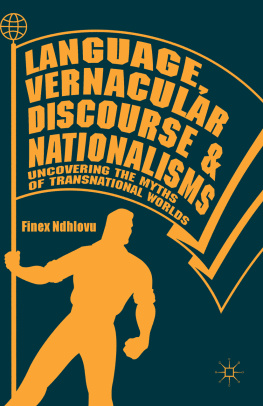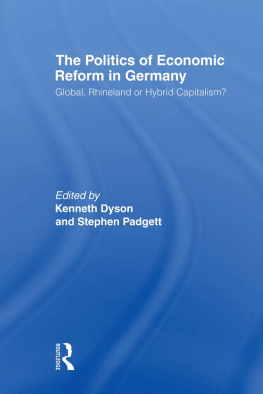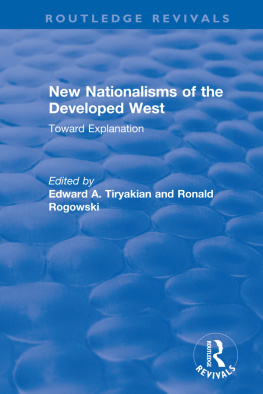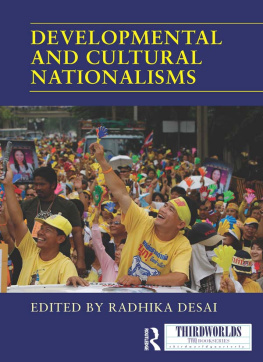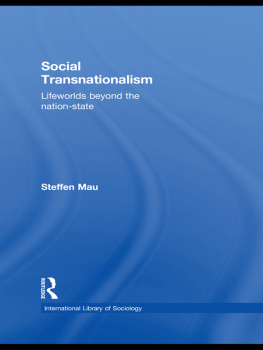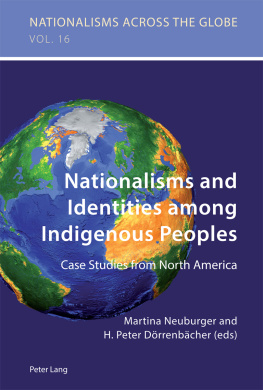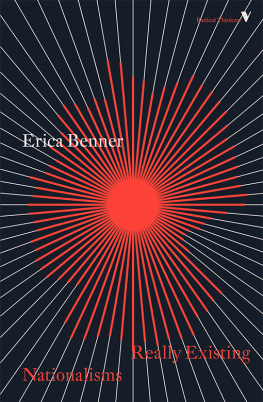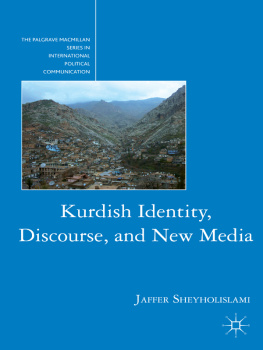1. IntroductionTheories, Concepts, Debates
The things that we supposedly know so foundationally about national identities, national borders , citizenship , parameters of belonging and entitlement to social and economic benefits of the welfare state, transnationalism and associated meta-languages are not as straightforward as they seem to be. We are told and believe that the world has become more and more transnational and interconnected than ever before. We are also told that societies have become superdiverse that supposedly unprecedented and unpredictable form of diversity that is perceived to be an outflow of contemporary trends in migration where people are moving from many places, to many places, through many places (Vertovec ). But in the midst of all this are deep-seated sentimentsloud and muted, formal and informalfor narrow, parochial, inward-looking, autochthonous and nation-state -centric narratives and imaginings of identity and belonging . How do we explain the tensions and contradictions that emerge out of this situation? Language, Vernacular Discourse and Nationalisms seeks to address this and many other related questions. It examines linguistic and discursive elements of social and economic policies and national political leader statements as an entry point in reading new meanings into current topical debates on border protection, national sovereignty , immigration, economic indigenisation, land reform and black economic empowerment . The book is a critique of resurgent nationalism -speak that mediates social and economic policy debates in a world that is otherwise considered to be transnational and interconnected. It tells the story of tensions and contradictions between formal policy enunciations on transnationalism on the one hand and vernacular expressions of the same on the other, as they are articulated at the level of the nation-state . The book adopts the novel yet rarely used vernacular discourse approach to contribute new points of method and interpretation that help us see what we couldntor wouldntsee before in scholarly conversations on nationalisms, transnationalism and other forms of identity imaginings in a transient world. The framework of vernacular discourse is leveraged to unpack and understand political communication in the reproduction of political power , or domination through political discourse , including the various forms of resistance or counter-power against such forms of discursive dominance. In particular, the analysis deals with the discursive conditions and consequences of social and political inequality that result from the strategic use of language by political elites, bureaucrats and other political actors, both state and non-state. Case studies include Australia , South Africa and Zimbabwe , with some passing remarks on other comparable countries around the world.
Since the signing of the Treaty of Westphalia in 1648 to end the thirty-year war among major European continental statesHoly Roman Empire, Spain, France, Sweden and the Dutch Republicthe modern world system has largely been a world of sovereign nation-states. The nation-state remains as the most enduring instrument of social and political closure. In the midst of other emerging units of analysis that are much bigger and broader, such as regionalism, globalisation and transnationalism , the nation-state appears to have mutated and taken new forms that are different from what obtained during the golden age of nationalism (1950s1960s). During the golden age of nationalism , recognition of autonomous nation-states was a major rallying point for anti-colonial nationalist liberation movements in Africa , Asia and other regions of the Global South . The nationalist movements were pushing for political independence and self-determination in those territories that were still under European colonial occupation. However, while the nation-state could have been rightfully typified as a container in the 1950s1960s, its present-day iteration sits rather uneasily within a world system that is now largely governed by the dictates of greater social, political, economic and cultural cooperation that are somewhat transnational in outlook. The nation-state is now under immense pressure both from below and from above. From below, the hegemony of the nation-state is being challenged by the increasing discontent and dissention of minority groups while forces of globalisation and transnational human population movements constitute a potent threat from above. It suffices to say notwithstanding these challenges posed by both local and translocal developments that are tied to forces of transnationalism and globalisation , the political significance of the nation-state seems to still remain relevantbut with its borders reconfigured, taking at least the following three forms.
First, nation-states retain clearly delineated physical borders that demarcate parameters of territorial rule, sovereignty, monopoly on the use of force and collectivisation of social risks by means of a state-sponsored welfare system (Mau : 8).
Third, the nation-state remains in symbolic and performative terms that reflect what some scholars have described as vanishing borders and borderless or seamless worlds (French : 172).
What is of greater significance here is that in all three reconfigurations, nation-states still retain a double process of closure. That is, nation-states continue to be characterised by closure of the geographic space through border controls and closure of the social and political space for membership through the control of nationality , citizenship and access to social security and other protections by the state. These two forms of closure are mutually constitutive: on the one hand, controls of human population movements into and from a nation-state serve as an external casing that regulates access to territories. On the other hand, this casing is embedded with the space of social and political membership through which access to welfare services is managed (Mau ). This essentially means the boundaries of the nation-state have not yet disappeared and are most likely not going to disappear any time soon. Today, the boundaries of the nation-state are ubiquitous, temporal and continue to be drawn everywhere. They are no longer only physical, but are also largely symbolic, performative and invisible and yet still remain real with their impacts and significance felt everywhere, by all of us. While the physical border as the only imaginary of nation-state s sphere of influence has to some extent receded, it still contains several attributes of its former self. Traditional attributes of the nation-state such as autonomy, self-determination, territorial integrity and non-interference from other nation-states still remain. Thus, though the previously presumed congruence between nation-state and society is on the wane and increasingly becoming unpopular, nation-states continue to have the decisive voice about membership of societies bounded by their bordersno matter how porous and fluid the borders might be. Nation-states are not necessarily assuming a new role. Rather, their role has been transformed, reconfigured and expanded beyond the traditional architecture of a bounded container.
Previous Theorisations
Nearly half a century ago, John W. Barton wrote about dominant perspectives on the configuration of the world and implications for the paths we follow in seeking solutions to world problems.
Which is the more representative model of the worldthe world of continents, islands and states or the world of transactions? If we adopt the nation-state we will use the language of relations between states and their relevant power , and have one set of solutions to the problems of conflict and world organisation. If we adopt the transaction one, we will use a different language to describe the world society, and have a different set of solutions to world problems. (John W. Burton : 43)

